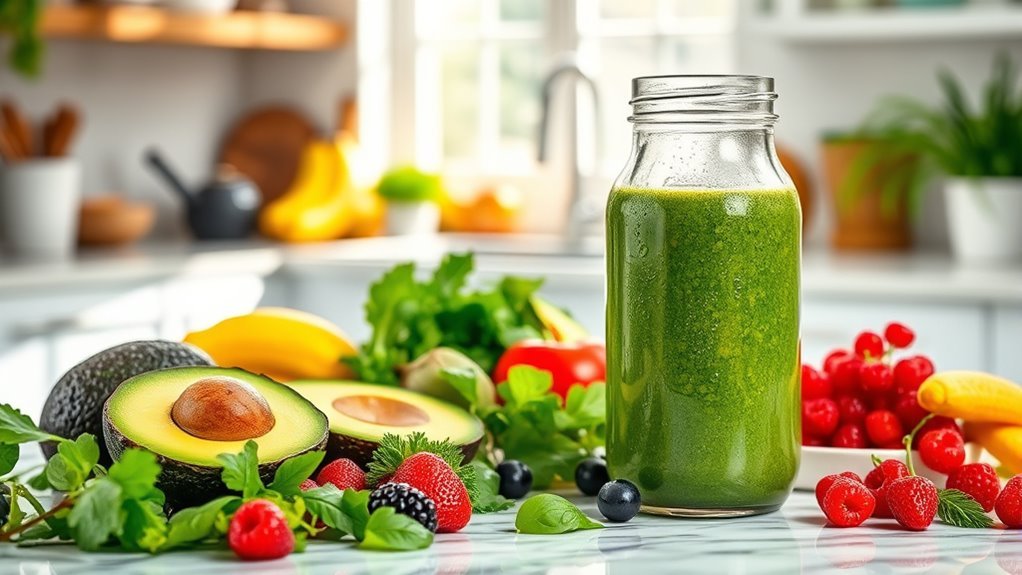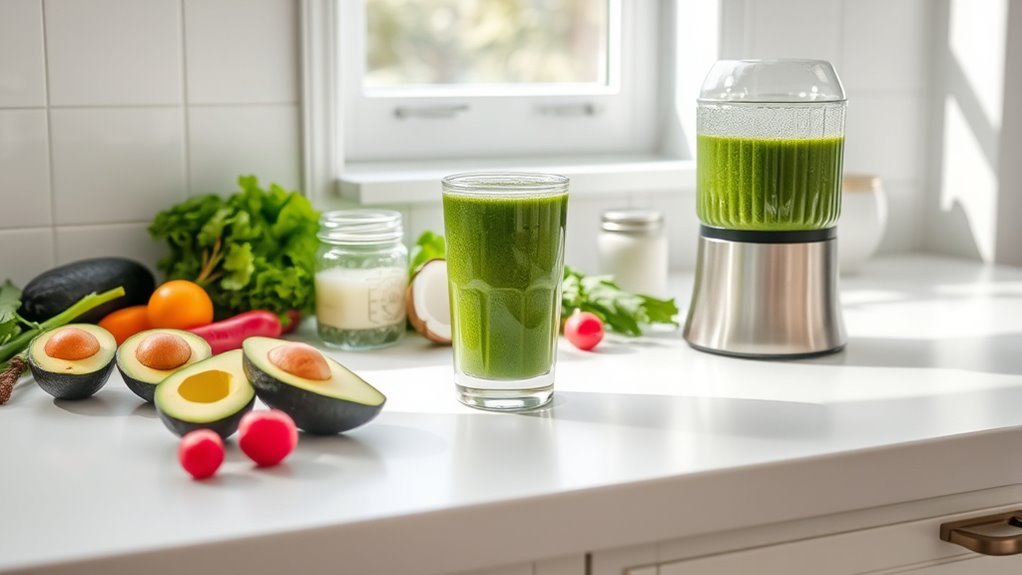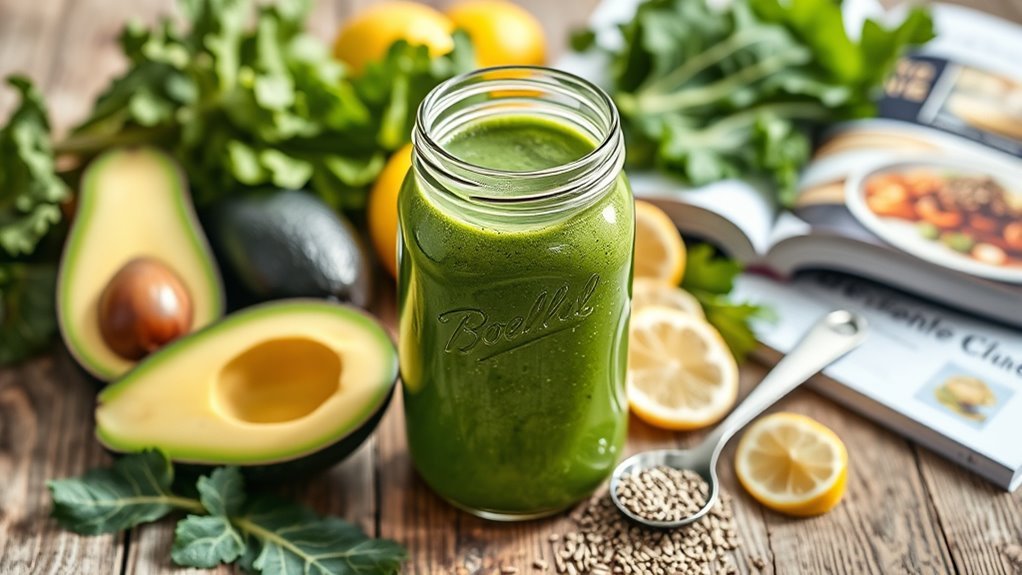To use a keto cleanse, start by reducing carbohydrate intake while increasing healthy fats to promote ketosis. Focus on high-quality foods: include healthy fats like avocados and nuts, low-carb vegetables, and clean protein sources. Avoid high-carb foods and sugary snacks to maintain ketosis. Staying hydrated is essential, and monitoring your body’s responses can help gauge progress. If you want to optimize your experience and discover strategies for success, there’s more to explore further.
Understanding the Keto Cleanse

When you’re considering a Keto Cleanse, it’s vital to understand its foundation and purpose. At its core, the keto basics involve drastically reducing carbohydrate intake while increasing fats, prompting your body to enter ketosis. This metabolic state allows your body to burn fat for energy, potentially leading to weight loss. The cleanse duration typically spans from a few days to a week, depending on individual goals and tolerance. During this period, it’s essential to focus on high-quality, nutrient-dense foods that support your body’s shift. Staying hydrated and monitoring your body’s responses can enhance your experience, ensuring you grasp the cleanse’s principles effectively. This metabolic state empowers you to make informed choices, promoting a sense of freedom in your health journey.
Benefits of a Keto Cleanse

A keto cleanse can be an effective tool for weight loss, as it encourages your body to burn fat for fuel instead of carbohydrates. Many individuals also report enhanced energy levels, likely due to stabilized blood sugar and reduced cravings. Understanding these benefits can help you make informed choices about incorporating a keto cleanse into your lifestyle. Additionally, the process of entering ketosis promotes not only weight loss but also improved mental clarity and focus.
Weight Loss Support
While many diets promise quick results, a keto cleanse stands out by offering a systematic approach to weight loss that can yield significant benefits. This method encourages effective portion control and allows you to enjoy satisfying keto snacks without derailing your progress. Here are some key benefits:
| Benefit | Description | Evidence |
|---|---|---|
| Appetite Control | Reduces hunger cravings | Hormonal balance |
| Fat Burning | Promotes ketosis for fat loss | Metabolic shift |
| Nutrient Density | Focuses on healthy fats | Essential vitamins |
| Increased Satiety | Keeps you fuller for longer | Fiber-rich foods |
| Sustainable Choices | Encourages long-term habits | Behavioral changes |
Incorporating a keto cleanse can enhance mental clarity and support your overall well-being as you pursue your weight loss goals.
Enhanced Energy Levels
One significant benefit of a keto cleanse is the enhancement of energy levels, which many individuals experience after shifting into ketosis. When your body adapts to burning fat for fuel instead of carbohydrates, you access a more efficient energy source known as ketones. This shift often leads to a noticeable increase in keto energy, allowing you to feel more alert and focused throughout the day. Additionally, a keto cleanse can provide a metabolic boost, optimizing your body’s fat-burning processes. As a result, you may find yourself tackling tasks with renewed vigor and stamina. Embracing this lifestyle not only supports your physical health but also fosters a sense of freedom and empowerment, enabling you to seize the day with enthusiasm. Moreover, the process of ketosis occurs when carbohydrate intake is greatly reduced, enhancing fat oxidation and altering energy processing.
Preparing for Your Keto Cleanse

Before starting your keto cleanse, it’s essential to understand the fundamental principles of the ketogenic diet, as this knowledge will guide your choices. Additionally, gathering important ingredients ahead of time guarantees you’re prepared for the shift and can maintain your dietary goals. By setting a solid foundation, you increase your chances of successfully steering through the cleanse. Embracing ketosis as a metabolic state allows your body to efficiently utilize fat for energy during this process.
Understand Keto Principles
Understanding the principles of the ketogenic diet is essential for effectively preparing for your keto cleanse. At its core, the ketogenic diet focuses on altering your body’s fuel source from carbohydrates to fats. This requires a careful balance of keto macronutrients: typically, about 70-75% of your daily calories should come from fats, 20-25% from protein, and only 5-10% from carbohydrates. By minimizing carbohydrate intake, you encourage your body to enter a state of ketosis, where it efficiently burns fat for energy. This shift not only supports weight loss but also enhances mental clarity and energy levels. Monitoring progress through ketone testing will empower you to navigate your keto cleanse with confidence and achieve the freedom you seek in your health journey.
Gather Essential Ingredients
Gathering essential ingredients is important for your success on a keto cleanse, as the right foods will help you maintain ketosis and maximize benefits. Focus on high-quality keto ingredients like avocados, leafy greens, nuts, and healthy oils, which provide necessary fats and nutrients. Incorporating these foods not only supports your energy levels but also helps curb cravings. Additionally, prioritize low-carb vegetables to ensure you’re getting essential nutrients while keeping your carb intake in check. Don’t overlook essential supplements; they can be critical. Consider magnesium, omega-3 fatty acids, and electrolytes to balance your body during the shift. These supplements can alleviate common keto flu symptoms and enhance your overall well-being. By strategically selecting your keto ingredients and supplements, you empower yourself to thrive on your keto journey, enjoying the freedom this lifestyle offers while optimizing your health.
Foods to Include in Your Keto Cleanse
A successful keto cleanse relies heavily on the right foods to help your body enter and maintain a state of ketosis. Focus on incorporating healthy fats, as they are essential for energy and satiety. Avocados, nuts, and olive oil are excellent choices, providing the necessary fuel while keeping carbs low. Additionally, low-carb vegetables like spinach and zucchini can enhance your meals with vital nutrients while keeping your carb intake minimal. Don’t forget about protein sources like grass-fed meat, eggs, and fatty fish; they’ll help sustain muscle mass during your cleanse. Additionally, keto snacks such as cheese, pork rinds, and nut butter can satisfy cravings without derailing your progress.
Foods to Avoid During Your Keto Cleanse
While incorporating healthy fats and proteins is essential for your keto cleanse, it’s equally important to recognize which foods can hinder your progress. High-carb foods like bread, pasta, and sugary snacks are significant culprits that can throw off your meal timing and disrupt ketosis. Even seemingly healthy options, such as certain fruits and starchy vegetables, can contain hidden sugars. When selecting keto snacks, steer clear of processed items loaded with additives and carbs. Instead, focus on whole foods that align with your goals. By avoiding these problematic foods, you’ll maintain the freedom to enjoy your keto journey while maximizing the benefits of your cleanse. Remember, it’s about making informed choices that support your lifestyle. Additionally, understanding good vs. bad carbs is crucial in ensuring that you select the best foods for your cleanse.
Sample Meal Plan for a Keto Cleanse
Creating a well-structured meal plan is essential for a successful keto cleanse, and it can greatly enhance your ability to maintain ketosis. By focusing on meal timing and incorporating tasty sample recipes, you can simplify your journey. Here’s a sample meal plan to get you started:
- Breakfast: Scrambled eggs with spinach and avocado
- Lunch: Grilled chicken salad with olive oil dressing
- Snack: Celery sticks with almond butter
- Dinner: Zucchini noodles with pesto and shrimp
- Dessert: Coconut milk chia pudding
Following this plan not only keeps you satisfied but also guarantees you’re receiving healthy fats and proteins essential for ketosis. Additionally, incorporating low-carb vegetables into your meals can further enhance nutrient intake. Remember, flexibility is key, so feel free to mix and match these recipes to suit your taste!
Listening to Your Body’s Signals
How do you know when your body is adapting to a keto cleanse? Pay attention to your hunger cues and body awareness. In the initial stages, you might experience cravings or fatigue, but as your body adjusts, hunger will stabilize. You’ll likely notice fewer urges to eat, indicating that your body is efficiently using fat for fuel. Trusting these signals can empower you to make informed decisions about when and what to eat. Additionally, increased energy and mental clarity can signal that your body is entering ketosis. By tuning into these changes, you can better navigate your keto journey, ensuring it aligns with your personal goals and needs. Embracing this awareness fosters a sense of freedom and control over your health.
Tips for Success During Your Keto Cleanse
Recognizing your body’s signals is just the first step in successfully steering through a keto cleanse. To thrive and experience the benefits of this lifestyle, you’ll want to incorporate these essential tips:
- Meal prep: Plan your meals ahead to avoid last-minute unhealthy choices.
- Hydration tips: Drink plenty of water and consider electrolyte supplements to combat fatigue.
- Monitor your macros: Keep an eye on your fat, protein, and carb ratios for best results.
- Stay active: Incorporate regular exercise to enhance fat-burning.
- Seek support: Engage with online communities or friends on the same journey for motivation.
Frequently Asked Questions
Can I Exercise While on a Keto Cleanse?
Yes, you can exercise while on a keto cleanse. However, it’s essential to take into account your exercise intensity and how your body adapts to ketosis. Initially, you might experience decreased energy, so starting with low to moderate-intensity workouts is recommended. As your body adjusts, you can gradually increase the intensity. A keto workout can still be effective, but listening to your body’s cues is vital for best performance and recovery.
How Long Should a Keto Cleanse Last?
How long should a keto cleanse last? Think of it this way: a race isn’t won in a sprint, but in a steady pace. An effective keto cleanse typically lasts between three to seven days, allowing your body to adapt to burning fat for fuel. The keto cleanse duration can vary based on individual goals and needs, but longer cleanses may lead to diminishing returns. Listen to your body and adjust accordingly to find your ideal duration.
Are There Side Effects of a Keto Cleanse?
Yes, there can be side effects of a keto cleanse. You might experience keto symptoms like fatigue, headaches, or irritability as your body adjusts to a low-carb diet. Additionally, digestive issues such as constipation or diarrhea are common due to the drastic change in fiber intake. It’s important to stay hydrated and consider electrolyte supplementation to ease these symptoms. Listening to your body is vital during this change for a smoother experience.
Can I Drink Alcohol During a Keto Cleanse?
You can drink alcohol during a keto cleanse, but it’s important to choose wisely. Many traditional alcoholic drinks are high in carbs, which can disrupt ketosis. Instead, opt for keto-friendly beverages like dry wines or spirits mixed with soda water. If you’re looking for alternatives, consider non-alcoholic options like sparkling water infused with herbs or citrus. This way, you can enjoy social occasions without compromising your goals or your freedom to choose.
Is a Keto Cleanse Suitable for Everyone?
A keto cleanse isn’t suitable for everyone; studies suggest that nearly 30% of individuals may experience adverse effects. While keto cleanse benefits include weight loss and increased energy, it’s important to follow keto cleanse guidelines tailored to your specific health needs. If you have certain medical conditions or dietary restrictions, consulting a healthcare professional is vital. Ultimately, understanding your body and its reactions can help you determine if this approach aligns with your freedom to choose a healthier lifestyle.
Frequently Asked Questions about Keto Cleanse
1. What is a Keto Cleanse?
A Keto Cleanse is a dietary regimen that focuses on eliminating carbohydrates and sugars while increasing the intake of healthy fats and proteins. The goal is to put your body into a state of ketosis, where it burns fat for fuel instead of carbohydrates. This cleanse typically involves consuming high-fat, low-carb foods and may also include supplements to aid in the detoxification process.
2. How do I start a Keto Cleanse?
To start a Keto Cleanse, first familiarize yourself with keto-friendly foods. Focus on high-fat foods like avocados, nuts, and olive oil, while avoiding grains, sugars, and starchy vegetables. It’s essential to plan your meals ahead of time and consider preparing a grocery list. Additionally, gradually reduce your carbohydrate intake over a few days to ease the transition and minimize side effects like the “keto flu.”
3. What are the benefits of a Keto Cleanse?
A Keto Cleanse can offer several benefits, including weight loss, improved mental clarity, and increased energy levels. By reducing carbohydrate intake and increasing fat consumption, many individuals report enhanced fat burning and appetite regulation. Additionally, some studies suggest that a ketogenic diet may have positive effects on metabolic health and may even support certain neurological conditions.
4. Are there any side effects of doing a Keto Cleanse?
Yes, some individuals may experience side effects when starting a Keto Cleanse, often referred to as the “keto flu.” Symptoms can include fatigue, headaches, irritability, and digestive issues. These side effects typically occur as the body adjusts to burning fat instead of carbohydrates. Staying hydrated, ensuring adequate electrolyte intake, and gradually transitioning into the diet can help mitigate these symptoms.
5. How long should I stay on a Keto Cleanse?
The duration of a Keto Cleanse can vary based on individual goals and health conditions. Some people may choose to do a cleanse for a few weeks to kickstart weight loss, while others may maintain a ketogenic lifestyle for an extended period. It’s important to listen to your body and consult with a healthcare professional to determine what duration is best for you, ensuring that you are meeting your nutritional needs throughout the process.
References
- https://www.ncbi.nlm.nih.gov/pmc/articles/PMC6833306/
- https://www.health.harvard.edu/staying-healthy/the-ketogenic-diet
- https://www.webmd.com/diet/obesity/keto-diet-what-is-it
- https://www.mayoclinic.org/healthy-lifestyle/nutrition-and-healthy-eating/expert-answers/keto-diet/faq-20461764
- https://www.cdc.gov/healthyweight/assessing/bmi/adult_bmi/english_bmi_calculator/bmi_calculator.html
- https://www.nutrition.gov/topics/whats-food/keto-diet


